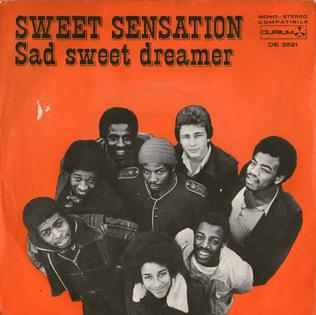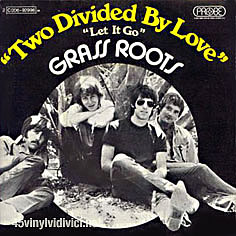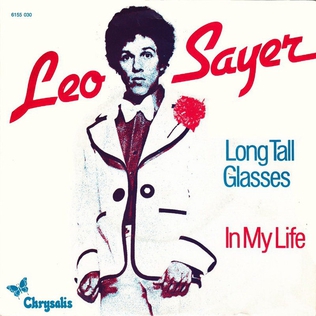
"If" is a song written by American singer-songwriter David Gates in 1971. Originally popularized by his group Bread, "If" charted at No. 4 on the U.S. Billboard Hot 100 when released as a single in 1971 and No. 6 in Canada. It also spent three weeks at No. 1 on the U.S. Easy Listening chart, and one week at the top of the Canadian AC chart.

"Until You Come Back to Me (That's What I'm Gonna Do)" is a song written by Morris Broadnax, Clarence Paul, and Stevie Wonder. The song was originally recorded by Stevie Wonder in 1967, but his version was not released as a single and did not appear on an album until 1977's anthology Looking Back. The best-known version of this song is the 1973 release by Aretha Franklin, who had a million-selling top 10 hit on Billboard charts. The song reached No. 1 on the R&B chart and No. 3 on the Hot 100 chart in 1974. It became an RIAA Gold record.

"Sad Sweet Dreamer" is a song by Sweet Sensation, which was a number-one single on the UK Singles Chart for one week in October 1974.

"Jazzman" is a 1974 song performed by Carole King, from her album Wrap Around Joy. King composed the music for the song, while David Palmer wrote the lyrics.

"(I've Been) Searchin' So Long" is a song written by James Pankow for the group Chicago and recorded for their album Chicago VII (1974). The first single released from that album, it reached number 9 on the U.S. Billboard Hot 100. It also hit number 8 on the Adult Contemporary chart. In Canada, the song peaked at number 5.

"Whatcha Gonna Do?" is a song by American rock group Pablo Cruise. This song was written by David Jenkins and Cory Lerios, two of the band's members. "Whatcha Gonna Do?" was a track from their album A Place in the Sun in 1977.

"The Most Beautiful Girl" is a song recorded by Charlie Rich and written by Billy Sherrill, Norro Wilson, and Rory Bourke. The countrypolitan ballad reached No. 1 in the United States in 1973 on three Billboard music charts: the pop chart, the country chart, and the adult contemporary chart, as well as in Canada on three RPM charts: the RPM 100 Top Singles chart, the Country Tracks chart, and the Adult Contemporary chart. Billboard ranked it as the No. 23 song for 1974.

"You're the Best Thing That Ever Happened To Me" — also known simply as "Best Thing That Ever Happened To Me" — is a song written by Jim Weatherly, and produced by Don Law. It was first recorded in 1973 by Danny Thomas. Soon after it was done by Ray Price from his album You're the Best Thing That Ever Happened To Me. The song enjoyed two runs of popularity, each by an artist in a different genre.

"Feel Like Makin' Love" is a song composed by singer-songwriter and producer Eugene McDaniels, and recorded originally by soul singer-songwriter Roberta Flack. The song has been covered by R&B and jazz artists including D’Angelo, Roy Ayers, Gladys Knight & the Pips, Lou Rawls, Isaac Hays, George Benson, Jeffrey Osborne, Larry Coryell, Johnny Mathis, and Marlena Shaw.

"Do It ('Til You're Satisfied)" is a popular song by funk group B. T. Express, written by songwriter Billy Nichols.

"I've Got the Music in Me" is a pop song by the Kiki Dee Band, released in 1974. It was written in 1973 by Bias Boshell, Kiki Dee Band's keyboardist. It is also the title of a Kiki Dee Band album released in 1974 and re-mastered and re-issued with bonus tracks in 2008.

"Everybody Plays the Fool" is a 1972 song first recorded by American R&B group The Main Ingredient, and written by J. R. Bailey, Rudy Clark and Ken Williams. It was the first single released from the group's album Bitter Sweet, released with the B-side "Who Can I Turn To ". "Everybody Plays the Fool" was the group's highest charting hit single, reaching No. 3 on the Billboard Hot 100 chart in the fall of 1972. It also peaked at No. 2 on the Billboard R&B chart and at No. 25 on the Billboard adult contemporary chart. It was certified gold by the RIAA.

Rockin' Chair is a hit 1975 song by singer Gwen McCrae. The song is not to be confused with either Fats Domino's 1951 R&B hit of the same name or the 1929 "Rockin' Chair" by Hoagy Carmichael.

"Temptation Eyes" is a 1970 hit song by The Grass Roots. It was released on their second compilation album, More Golden Grass.

"Clap for the Wolfman" is a song written by Burton Cummings, Bill Wallace, and Kurt Winter performed by their band, the Guess Who. The song appeared on their 1974 album, Road Food. The song was ranked #84 on Billboard magazine's Top Hot 100 songs of 1974.

"So in to You" is a 1977 hit single by the Atlanta Rhythm Section. It was the first release from their sixth studio LP, A Rock and Roll Alternative.

"Sooner or Later" is a 1971 hit song by The Grass Roots. It was released as a single and put on their third compilation album, Their 16 Greatest Hits. It reached number 9 on the US Billboard Hot 100, becoming their third and last top ten hit.

"Two Divided by Love" is a 1971 hit song by The Grass Roots. It was the first single released from their sixth studio album, Move Along.

"Wildwood Weed" is a 1964 country-western parody song written by Don Bowman. It was the first track of Bowman's debut album, Our Man in Trouble..."It Only Hurts When I Laugh", under RCA Victor. Its most famous version was recorded in 1974 by Jim Stafford and became the fourth of four U.S. Top 40 singles from his eponymous debut album. Musically, the song takes its inspiration from the Carter Family's recording "Wildwood Flower". In both versions, the lyrics in the verses are spoken rather than sung.

"Long Tall Glasses (I Can Dance)" is a 1974 song by Leo Sayer, co-written with David Courtney. It was released in the United Kingdom in late 1974, becoming Sayer's third hit record on both the British and Irish singles charts and reaching number four in both nations. It was included on Sayer's album Just a Boy.




















